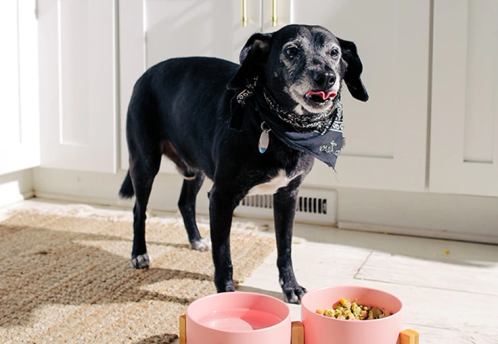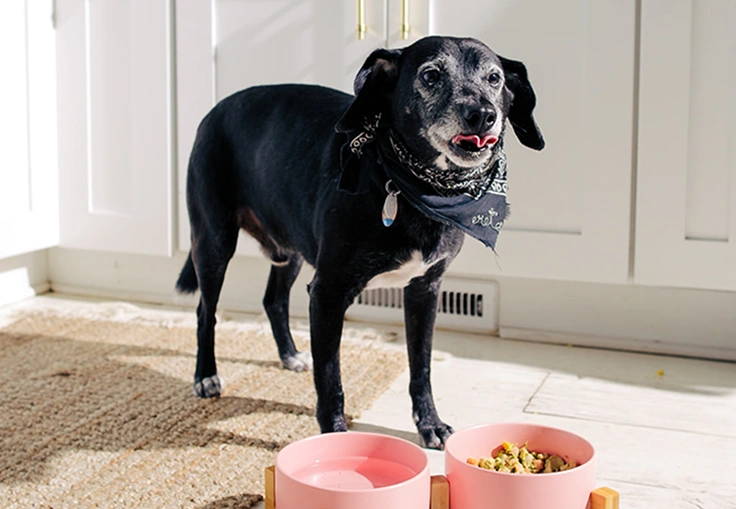Feeding Your Senior Dog
Every dog has different nutritional needs, and senior dogs are no exception. Once your beloved pup reaches his golden years, it can be even tougher to understand his shifting dietary requirements. This can often leave pet parents with a lot of questions:
- Is “senior dog food” necessary?
- What is the best senior dog food on the market?
- What do you do if your senior dog refuses to eat?
While you’re here, check out our success story on how our gently cooked dog food helped to support Bailey, a 13-year-old lab mix.
Check out the answers from our pet nutrition experts to some of the most common questions we receive about senior dogs below.
At What Age Is a Dog Considered a Senior?
It turns out there’s no medically agreed-upon definition of what is considered a senior dog. Every dog is different, but age and weight are major factors. Generally, dogs that grow to size (think Great Danes) have a shorter life expectancy, and we deem them senior at an earlier age, around 5 or 6. Small breeds (like Beagles) tend to live longer and may not be seniors until age 8 or 9.
Still, many dogs are very healthy even when they reach these age ranges. In the future, genetic testing might tell us more about how and when the ‘senior’ period begins.
Differences Between Senior Dog Food vs. Regular?
Is there a difference between senior dog food, regular adult dog food, and food labeled “all life stages” or “multi-stage”? Not necessarily. In fact, some food products might be identical and only market differently; that is, only the packaging changes. According to our experts, there’s no regulation of dog foods claiming to cater to seniors, which is why there’s so much confusion on the topic.
There certainly are, however, some dietary factors that can help manage the physical and medical changes dogs experience as they age. Here are some of the ways a senior dog diet might differ from a regular adult dog diet:
- Nutrient adjustments
- Higher digestibility
- Softer texture and/or formulated to fight dental diseases
- Added joint supplements
- Added MCTs, omega-3s, and antioxidants
- Nutrient Adjustments are Needed for Senior Dogs
While some dogs may not need a change in the nutrient composition of their diet as they age, there are nutritional adjustments that may specifically benefit senior dogs, depending on a number of factors (e.g. their activity level or underlying medical conditions). Here are some of the most common:
- Older dogs may require more protein in their diet: “How much protein does a senior dog need?” is a question we get often and for good reason. The protein stores of a senior dog turn over more rapidly than in younger dogs, and like humans, dogs can start to lose muscle mass as they age. Extra protein supplies amino acids that help make up for that loss, and these keep aging pups stronger and more mobile. Senior dog diets should have more than 75 grams of protein per 1,000 calories. To get an accurate picture of the protein-to-calories ratio in your dog’s current food, check out our pet food nutrient calculator.
Note that there is one caveat to senior dogs and increased protein here: Phosphorus content tends to increase with the amount of protein, and it is recommended that you find ways to reduce phosphorus intake in senior dogs with kidney disease. Once the disease reaches a certain stage, restricting phosphorus becomes important to prevent its progression. It remains controversial as to whether or not protein needs to be restricted in these dogs. What is clear is that higher-protein diets for senior dogs have never been associated with a higher likelihood of developing kidney disease in dogs.
-
Some senior dogs may require higher or lower fat in their food: Some senior dogs struggle maintain weight. If you notice your dog dropping pounds, talk to your vet about underlying medical conditions that could affect his appetite, calorie needs, and/or digestion. If muscle mass is the problem, a high-protein diet is critical; if your dog is getting thinner for some other reason, your vet may recommend a diet higher in fat. If your senior dog is struggling with obesity, your vet might recommend a low-fat diet. On the other hand, a diet with reduced fat may be in order for a senior dog struggling with obesity.
-
Some senior dogs may need more or less fiber in their diet: There are two categories of fiber: soluble, which serves as “food” for bacteria to ferment, and insoluble, which adds bulk to the stool that bacteria cannot break down. Mixed fibers, like psyllium, combine both and appear in some senior dog foods to help improve general gastrointestinal support. For those senior dogs who have trouble with constipation, a dog food diet higher in fiber may help them stay regular. On the flipside, some senior foods may have less fiber than usual, perhaps because fiber may decrease the absorption of essential nutrients. It is not yet clear which fiber modification (more or less), if any, is best for senior pets.
-
Lower or higher calorie density for senior dogs: If you are asking yourself, “Well, how many calories does a senior dog need?” then the short answer is: it is complicated. Some dog foods for seniors are formulated to be more calorically dense, and others, less. Finding the appropriate calorie density (calories per cup) depends on whether or not your dog needs to gain or lose weight. Some general guidelines:
-
For weight gain: More than 450 calories per cup for kibble, or a higher-fat diet with more than 50 grams of fat per 1,000 calories.
-
For weight loss: Less than 350 calories per cup for kibble, or a diet with portions premeasured for your dog.
-
Lower-calorie foods are often recommended because senior dogs tend to be less active than their younger counterparts. In fact, dogs’ activity levels tend to drop by as much as one-third to one-half as they age; that means they do not need to take in as many calories. Portion control is key! That said, for those senior dogs who are losing muscle mass, a vet might recommend a diet higher in protein and calories.
Finally, always consult your vet, who can help you determine what dog food diet is right for your senior dog and make adjustments accordingly.
Check out this study for more reading on senior dog nutrition. Remember, there is currently no senior, geriatric, or mature dog food nutrient profile recognized by the Association of American Feed Control Officials (AAFCO). That means there is no guarantee that senior food will contain a certain amount of protein, fiber, or any of the nutrients mentioned here.
Dog Food for Senior Dogs Requires Higher Digestibility
Dogs’ guts do change as they age, but how those changes impact a dog’s digestion of critical nutrients is still being studied. One 2005 study suggests that, despite shifts that happen in a dog’s intestines, colon, and bacterial microbiome over time, aging alone does not decrease a dog’s ability to digest nutrients. What is more likely is that senior dogs are more susceptible to digestion-related conditions (like a dog food allergy, inflammatory bowel disease, colitis, or pancreatitis) that could require specific dietary changes.
Still, the best diet for a dog that is aging, with or without medical conditions, is usually one that is tailored to that dog. You should see a range of modifications to senior dog foods that try to target digestion-related changes, from added soluble fiber (to function as a prebiotic, or food for the bacterial microbiome) to increased fat (to make the food more dense calorically or to aid in digestion). These adjustments may not be right, or even necessary, for most dogs. Bottom line: every dog digests food differently, no matter their age. If your senior pet does not seem to be taking to a particular food, it may be time to try something different.
Talk to your vet for recommendations, and consider a gently cooked dog food like Nom Nom, which is easier for the body to break down and pull nutrients from than some processed kibble or uncooked diets.
Dog Food for Seniors to Fight Dental Disease
If your senior dog is between dental cleanings or has lost several teeth due to dental disease, there is one simple change that may help him come mealtime: switching to a canned, gently cooked, or raw dog food diet that is easier to chew. Breaking through kibble can be tough for senior dogs, who are more likely to have loose or infected teeth.
In fact, many dog food products out there marketed or labeled specifically for disease are just regular foods with more moisture added. Of course, some do have ingredients meant to combat oral problems, including:
-
Additives like sodium hexametaphosphate or citric acid help prevent the minerals that cause calculus (hard, rock-like material on teeth) from sticking together.
-
Dog probiotics, aka healthy bacteria, may play a role in oral health.
Keep in mind that the best treatment for infected gums or teeth is a cleaning and proper care from a vet.
Added Joint Supplements for Senior Dogs
Dogs are more likely to develop arthritis as they age, especially if they are overweight or obese. Supplementing with glucosamine and chondroitin, both precursors for may reduce the symptoms of arthritis in dogs after a few months, according to some studies. Research offers even more definitive evidence for the omega-3 fatty acids EPA and DHA, both of which have been shown to reduce inflammation in the joints and the symptoms of arthritis (like difficulty getting up, soreness, and lameness).
Unfortunately, many dog food diets marketed for seniors, advertising glucosamine, chondroitin, EPA, and DHA do not contain effective amounts of these substances. To get results, you may need to add dietary supplements to your dog’s food unless it is one specifically labeled for joint health.
Added MCTs, DHA, and Antioxidants in Dog Food
Dogs, like humans, may show changes in memory and the ability to learn as they age. Several studies suggest that the following substances and nutrients may help to reduce some of the effects of these changes and are therefore added to some foods marketed to senior dogs:
-
Medium-chain triglycerides or MCTs, a type of fat. Look for coconut oil or palm oil as sources on food labels, or you can add MCTs to your dog’s food as a supplement.
-
Antioxidants like those found in some veggies, such as carotenoids (beta-carotene is one example) and other phytonutrients. While some pet parents malign fruits and veggies, they contain some of the most interesting and unique compounds that can influence a pet’s health. One benefit of a minimally preserved fresh diet over a kibble or canned diet is that it can offer antioxidants that have not degraded due to processing and storing.
-
DHA, an omega-3 fatty acid that appears in high concentrations in fish and algae oil, or as with MCTs, you can add DHA as a supplement to your dog’s diet. A reasonable starting amount is 0.5 grams DHA per 1,000 calories.
What Is the Best Senior Dog Food?
When it comes down to it, there is no one best senior dog food. It is important to evaluate your own dog before making adjustments to his diet because every dog (especially an older one) needs a different nutritional strategy. Just because your dog is a senior does not mean he needs senior food.
Many ‘adult’ or ‘all life stages’ dog foods may be as or even more beneficial than diets marketed for seniors.
Food Ingredients That May Be Problematic for Senior Dogs
Finding the best dog food for senior dogs involves looking for certain beneficial ingredients while also avoiding those that could pose problems. Here are two to keep in mind:
-
Certain grains: There is no evidence that grains are harmful to senior dogs, but some grains may be less digestible than other plant-based proteins and carbohydrates. Some dogs may find diets high in grains and low in animal proteins less palatable, too.
See our article on grains for dogs to learn more. -
Grain-free proteins: As always, there is a flipside. Interestingly, newer research shows an emerging association between low levels of blood taurine, a nutrient important for heart function, and grain-free diets that are high in legumes (like peas, lentils, and chickpeas). It may be because these grain-free protein sources are less digestible. If your dog has heart disease, ask your vet about what is currently known about this association.
Best Senior Dog Food for Small Breeds
Though you may often see breed-based foods on pet store shelves, they are usually a function of marketing. It is not really critical to pick a “small breed” food for senior dogs; what they need nutritionally really does not differ all that much from what larger breeds need. However, if your furry friend eats kibble, it is good to choose one that is scaled down to a more appropriate size and shape for him.
Here are a few other recommendations to help you find the best senior dog food for small breeds:
-
Small breeds typically live longer than large breeds. For that reason, some experts suggest a diet rich in antioxidants to help prevent free-radical damage over time. Ask your vet to recommend a brand that fits the bill.
-
Smaller dogs are more likely to be overweight as they age if fed freely, so portion your dog’s food carefully. Pre-portioned foods or those that are less calorically dense are good choices.
-
If an aging small breed dog develops a certain health condition, your vet might recommend a prescription diet specially formulated and clinically proven to help treat it.
What Is the Best Senior Dog Food for Large Breeds?
Large breed adult or senior dogs, unlike feeding large breed puppies (who need more carefully controlled calcium levels than smaller breeds), don’t necessarily need special dietary considerations. (Too much calcium is a concern only during the growth stage when bones are forming.) Large breeds can often keep on eating any adult or all life stages food that meets their needs.
Here are a few other recommendations to help you find the best senior dog food for large breeds:
-
Large breed dogs often have a poorer stool quality than small breeds. For this reason, too much soluble fiber can worsen the effect, and some insoluble fiber, like what appears in veggies like green beans or broccoli, can be beneficial. If your senior large breed pet is having digestive difficulties, your vet can suggest a dog food diet with extra insoluble fiber.
-
The negative effects of arthritis can be even more pronounced in large breeds. A diet with extra EPA and DHA can help to lessen the symptoms; food with more than 1 gram of EPA and DHA per 1,000 calories will be most effective.
What to Feed an Old Dog That Will Not Eat
Has your senior dog stopped eating? Do not stress too much; as they age, dogs tend to become less active and eat less to maintain their weight. Cognitive changes could impact a senior dog’s eating schedule or frequency, too. For a dog who is still in good shape, this is not a huge concern, but there are a few steps you can take:
-
See your vet. A professional can help rule out any serious underlying causes and prescribe supplements or new foods to help keep your dog on track into his twilight years. Set a regular schedule for checkups; twice a year is recommended for senior dogs.
-
Try a new flavor. If your senior pup has developed an aversion to a particular flavor or ingredient, or if he is simply grown bored of his usual food, switching things up might help.
-
Add moisture. Canned, fresh, or raw foods are often more palatable than dry foods to picky dogs (of any age) due to the extra moisture inside. Adding a little water to kibble is also an option.
-
Pick an energy-dense food. They are usually higher in fat and, therefore, more palatable for many dogs.
For more advice on what to feed an old dog that will not eat, and how to put weight on an old dog who is losing pounds, check out our “Dog Not Eating” guide.
Conclusion: Giving Your Older Dog the Best with Proper Nutrition
Feeding an older dog is less about labels and more about responding to how your dog’s needs change with age. Protein levels, calorie density, digestibility, and texture can all play a role in supporting comfort and daily energy, especially when paired with veterinary guidance and supplements when appropriate.
There’s no single formula that fits every senior dog. Some do better with softer, easier-to-digest meals, while others benefit from higher protein or added omega-3s. Paying attention to appetite, behavior, and overall condition helps guide smart adjustments over time. With thoughtful choices and regular check-ins with your vet, senior dogs can continue to enjoy their meals, their routines, and their time with the people they love most.




